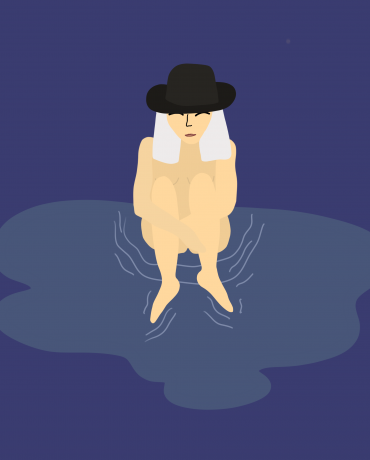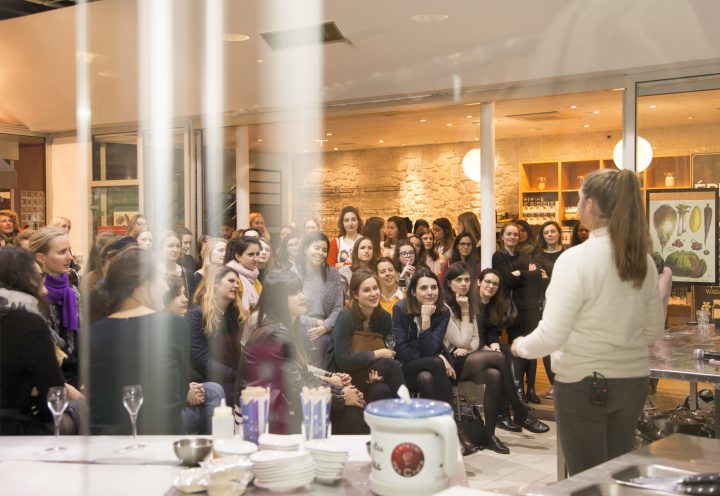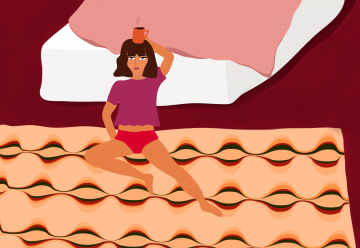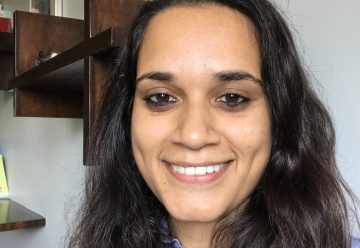
This week, we wanted to talk to you about menopause. In fact, we’ve been wanting to talk about this subject for several weeks now, but we don’t really know how to go about it. Because menopause, we don’t talk about it. It’s a thing, which is there, which exists, but nobody talks about it until it comes to mess up our lives. A bit like Fabien Lecoeuvre in the end.
And to be quite honest, we didn’t know exactly what menopause meant, except: “it’s the day we stop having our period”.
For example, at what age does it occur? When the question was asked in the team, there were all kinds of answers. From 40 to 60 years old, whereas the median age is 51.
51 years old, that means several things.
The first is that our period budget is easier to calculate than our “restaurant” budget. (51 – our age x 12 months x 10€. Basically)
The second is that, in fact, before, when life expectancy was twenty-five years (in the 12th century), menopause did not exist. One day, a woman had menopause. And it was unheard of. Which means that if life expectancy increased by several more decades, incredible things might happen, like our hair turning blue or the appearance of a few feathers on our elbows. We don’t know.
What we do know is what happens when we are born, because that’s how it’s always been. Even in the 12th century. And so female babies have always been born with oocytes stored in their ovaries. And you see when you go away for the weekend and you take three dresses, fifteen sweaters, six pairs of shoes because IF? Well, it’s the same, there are a lot of oocytes in stock because you never know, so let’s take a million.
The oocyte is something that we don’t hear much about unless he makes THE MEETING that will change his life: a spermatozoon. In which case, it will become an egg. And then we immediately say, yes, okay I see. Of course. An egg. It’s the one that played in plus belle la vie, right?
The egg has a difficult life. Its life is like the Euromillions but worse. Every month, it leaves its ovary, confident, with its little backpack and says to itself “this is my moment” or “this is my moment” if it aims at an international career. He holds his thumb out to the side of the road and waits for a sperm to pass by to be fertilized and become an egg. If that happens, it will then become an embryo then a fetus then a baby then a child then an adult then an old man then… that’s it. If no one stops, it is said that the endometrium, which will not have to grow an embryo, will shed (= loss of cells by the mucous membranes) and this is the drama. Er, the period. In short, it’s the same thing.
The problem is that before, hitchhiking worked much better. Now, traffic is sort of regulated. There are condoms, pills, IUDs, Netflix… so well, the oocyte that tries his luck, he KNOWS it’s going to be complicated. But he goes anyway because he has no smartphone, no TV, no book… he’s a bit of a pain in the ovary.
Nevertheless, out of the million oocytes present at birth, there are some that will never take the road because they are too lazy. Or rather because the oocyte is a cell and cells die too. And yes. So out of a million oocytes, only 400 to 500 will come out during one of the woman’s ovulations hoping to be fertilized. The others will die in slippers.
The menopause begins when our stock of ovarian follicles (= the sac in which the oocyte is located) is less than 1000. This is when an alarm goes off telling the body to put its foot down (not literally of course, that would be too weird: “Why are you putting your foot down? “Because I have more than 1000 oocytes. “Ah. “). The ovaries no longer produce estrogen or progesterone, two hormones that allow for many things, including the creation of a baby. Well, I went a little fast, but in the end, that’s it.
The problem is that these two hormones don’t just swell the uterine lining with blood for a pregnancy (you see where we’re going with this, right?). No, these hormones also act on the skeleton, the skin, the brain, the heart, the digestive system… in short: on everything.
This period when the body does not want to work for less than 1000 eggs is called the perimenopause. It is a period that can last from one to eight years (fingers crossed) until the menstruation stops completely. The body is said to be in hormonal transition. The body says “ok I stop working, but I want to help out here and there”. Except that we all know what happens when we do things by halves: badly.
Estrogen is a hormone that regulates body temperature for example. This is why women in perimenopause have hot flashes. Because the body, the thermostat, is no longer its business. It has bridge.
And since this hormone also takes care of all the things mentioned above, the bones become more fragile, the skin loosens up, the weight increases, it is more difficult to fall asleep, the mood is disturbed (40% of depression in perimenopausal women), the cognitive performance also declines: in short, we get old.
When the body really doesn’t do anything anymore – which isn’t much worse, frankly – there are no more periods (the excess blood in the uterine lining: no more) and so, it’s the menopause.
That’s it. Now you know, and so do we.
And we are well aware that we haven’t just told you the best news of your day, but knowledge is power. And women can do anything.
Article written by Sophie Astrabie.
Illustration by @gomzillustrations займы онлайн рф без карты






